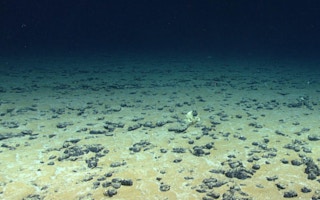Credit Suisse has committed to rule out financing deep-sea mining.
To continue reading, subscribe to Eco‑Business.
There's something for everyone. We offer a range of subscription plans.
- Access our stories and receive our Insights Weekly newsletter with the free EB Member plan.
- Unlock unlimited access to our content and archive with EB Circle.
- Publish your content with EB Premium.
The Swiss multinational bank published new lending guidelines for sectors with high environmental, social and governance (ESG) risk on Wednesday, and declared that it would not provide any financing for the exploration or extraction of seabed minerals.
It is the latest global bank to step away from the controversial pursuit of deep-sea minerals, which supporters of extraction say is necessary to power the energy transition, and less environmentally and socially destructive than land-based mining.
Seabed metals, which include copper, nickel and cobalt, could be used to meet soaring demand for the materials needed to make electric car batteries, wind turbines and solar panels, pro-mining groups say. They could also be used to manufacture weapons.
Environmentalists point out that not enough is known about the potential impacts of mining the ocean depths — a realm that scientists know less about than the surface of the moon — for extraction to go ahead. Commercial seabed mining could proceed as soon as 2023, once regulations are finalised.
Banks that have pledged to avoid deep-sea mining financing include British lenders Lloyds, NatWest, and Standard Chartered, Dutch bank ABN Amro, and Spanish group Banco Bilbao Vizcaya Argentaria.
Asian banks have yet to publish investment and loan policies on deep-sea mining.
In response to a query from Eco-Business on its position on deep-sea mining, OCBC Bank’s group head, risk policy, Chng Bee Leng, said it would “not engage in any financing activity where there is clear evidence of unmitigable adverse impact to the environment, people or communities or a violation of local regulations.”
Under the bank’s Responsible Financing Framework, OCBC does not specifically refer to deep-sea mining in its section on mining and metals.
DBS, Southeast Asia’s largest bank, told Eco-Business: “While we do not have any ESG policies especially addressed to deep-sea mining, DBS adheres to international best practices for its financing.”
UOB has not responded to Eco-Business’ queries about its deep-sea mining policies.
Deep risk
Andy Whitmore, finance advocacy officer at the Deep Sea Mining Campaign, an association of NGOs campaigning against seabed mining, said it is “hugely significant that another major bank [Credit Suisse] has committed not to fund those engaged in the exploration or extraction of deep-sea minerals.”
“There is a growing momentum among responsible financiers that the risks are too great to invest in this new, experimental industry,” he said.
As well as reputational risk for banks, environmentalists worry that deep-sea mining could destroy fisheries, obliterate unknown ecosystems, and alter the oxygen carrying capacity of the ocean.
Bernadette Victorio, director of Fair Finance Asia (FFA), a collective of NGOs campaigning for responsible finance, said her group takes a “very strong position against deep-sea mining.”
FFA is set to launch a revised methodology for its Fair Finance Guide, which advises banks on responsible lending practices, that will benchmark banks on their deep-sea mining policies.
A report by FFA’s Japan affiliate, released earlier this year, analysed the lending activity of Japanese finance groups and recommended they develop strict policies on deep-sea mining, and publicly declare their support for a ban on seafloor extraction.
Japan is one of a handful of nations leading the charge on deep-sea mining, which also includes China, France, the United Kingdom, Germany, Belgium, South Korea, and Russia.
The United Nations Environment Programme Finance Initiative’s (UNEP FI) guidelines for sustainable ocean finance exclude deep-sea mining as a sustainable option for financial institutions.
Brands such as Samsung, Google, BMW and Volvo have declared that they will not use metals sourced from the deep-sea in their supply chains.
But some observers believe that deep-sea mining is inevitable, because of the commercial value of the seafloor, estimated to be worth US$150 trillion in gold deposits alone, that would provide billions to the financial services industry in loans and insurance.
The wheels are already in motion for commercial seabed mining. The International Seabed Authority (ISA), the Kingston, Jamaica-headquartered governing body for the seafloor, has opened areas for mining exploration in the Pacific, Atlantic and Indian Oceans, and entered into exploration contracts with 29 firms.
The main area for exploration is a 4.5 million square kilometre stretch of the Pacific floor known as the Clarion-Clipperton Zone (CCZ), where there are believed to be 7.5 billion tonnes of manganese, 340 million tonnes of nickel, 275 million tonnes of copper, and 78 million tonnes of cobalt in polymetallic nodules.
However, earlier this month, Tuvalu, a pacific island nation that had sponsored a mining company planning to extract metal from the CCZ, rescinded its backing on environmental grounds.
Prominent marine biologist Dr Sylvia Earle said in an interview with Eco-Business this week that to access deep-sea minerals “means destroying the tree of life. So why would we even think of doing it?”
“I don’t see the cost-benefit: There’s an illusion that they’re free goods out there just waiting to be captured,” she said.

















